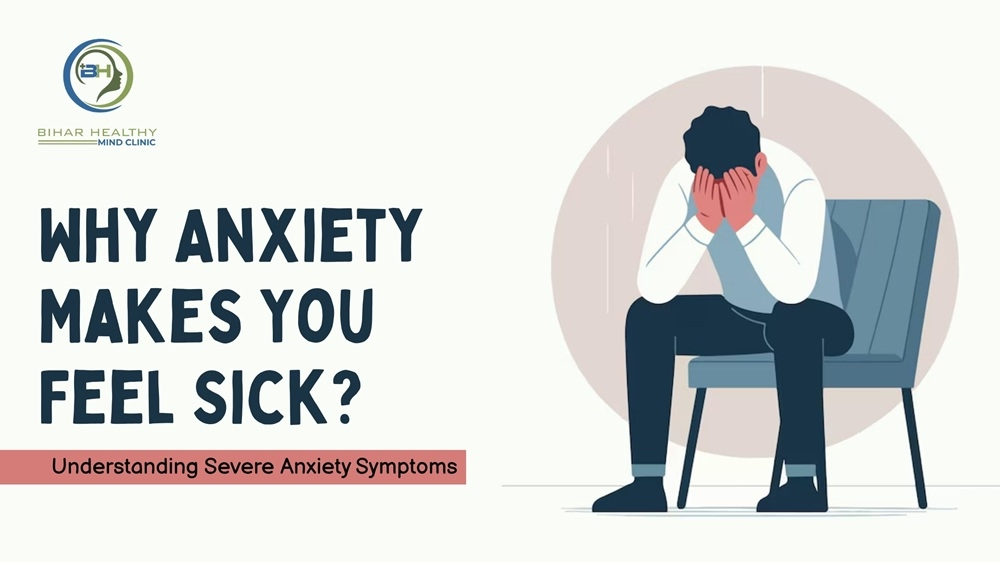
Anxiety is often thought of as a mental or emotional struggle - restlessness, worry, or an inability to focus. However, many people do not realize that anxiety has very real physical effects on the body. For some, these symptoms are so severe that they begin to feel genuinely sick. If you have ever wondered “Why anxiety makes you feel sick?”, you are not alone.
At Patna Psychiatry, under the guidance of Dr. Saurabh Kumar (MD, Psychiatry), patients frequently share concerns about nausea, dizziness, and even vomiting during episodes of heightened anxiety. In this blog, we will explore the science behind these symptoms, how anxiety affects the body, and what treatment options are available.
Understanding the Mind-Body Connection
The human brain and body are deeply interconnected. When you experience anxiety, your body perceives it as a form of stress or danger. This activates the body’s fight-or-flight reaction, causing the release of stress hormones such as adrenaline and cortisol. These chemical messengers prepare your body to respond to a threat, whether real or imagined.
-
While this response is designed to protect you, it can also lead to unpleasant physical effects such as:
- Rapid heartbeat
- Shallow breathing
- Digestive issues
- Sweating or trembling
For many people, one of the most distressing symptoms is the stomach turning upside down, feeling nauseous or even vomiting.
Anxiety and the Digestive System
The digestive tract is extremely sensitive to stress and emotions. Specialists often describe it as the “second brain” because it contains numerous nerve pathways that transmit messages to the brain through the vagus nerve.
-
When anxiety spikes:
- Stomach acid production increases, causing discomfort.
- Digestion slows down, leading to bloating or cramping.
- Nausea or vomiting may occur as the body attempts to respond to perceived danger.
This explains why people often search for answers to questions like “can anxiety cause vomiting?” or “does anxiety cause vomiting?”. The truth is “yes, it can”. While not everyone with anxiety experiences this, many individuals report that anxiety vomiting becomes a recurring problem during severe episodes.
Why Anxiety Makes You Feel Sick?
Anxiety makes you feel sick because it overwhelms your nervous system. The body reacts as though it is facing a physical threat. Increased adrenaline and changes in blood flow affect your digestive organs, leading to nausea, dizziness, or gastrointestinal distress.
Imagine standing before an audience to give a speech. Your palms sweat, your heart races, and suddenly, your stomach churns. For people with chronic anxiety, this sensation can happen daily, even without an obvious trigger.
This cycle can create anticipatory anxiety, worrying about getting sick in public, which in turn makes symptoms worse.
Severe Anxiety Symptoms to Watch Out For
While occasional nervousness is normal, severe anxiety can significantly impact daily life.
-
Symptoms may include:
- Persistent nausea and stomach pain
- Unexplained anxiety vomiting
- Rapid heartbeat and dizziness
- Difficulty breathing or chest tightness
- Headaches and muscle tension
- Insomnia or disturbed sleep
If you frequently ask yourself “does anxiety cause vomiting or other sickness symptoms?”, it may be a sign that your anxiety needs medical attention.
Managing Anxiety-Induced Sickness
If you experience nausea, vomiting, or digestive discomfort linked to anxiety, here are some strategies that can help:
- Breathing Exercises - Practicing slow and steady breaths helps soothe the nervous system.
- Progressive Muscle Relaxation - A technique designed to ease accumulated physical strain.
- Mindfulness Meditation - Encourages awareness and reduces racing thoughts.
- Dietary Adjustments - Limiting caffeine and alcohol can help reduce nausea.
- Professional Therapy - Cognitive Behavioral Therapy (CBT) is highly effective in managing anxiety-related symptoms.
- Medical Treatment - In some cases, psychiatrists prescribe medications to regulate anxiety and control severe physical symptoms.
At Patna Psychiatry, patients receive personalized treatment plans that may include therapy, lifestyle modification, and medication when needed.
When to Seek Professional Help
Feeling nauseous before a big exam or job interview is common, but if anxiety frequently makes you feel physically ill, it should not be ignored. Frequent vomiting due to anxiety may result in dehydration, lack of essential nutrients, and poor overall health.
-
Consulting a specialist is essential when:
- Nausea and vomiting happen without medical causes.
- Symptoms interfere with work, studies, or relationships.
- You develop a constant fear of getting sick.
This is where professional guidance matters. If you are looking for the Best psychiatrist in Patna, Dr. Saurabh Kumar at Patna Psychiatry provides advanced psychiatric care with compassion and expertise.
Final Thoughts
Anxiety is not “just in the head.” It has tangible effects on the body that can leave individuals feeling truly unwell. From nausea to full episodes of vomiting, the physical consequences of anxiety are real and treatable.
If you’ve ever questioned “why anxiety makes you feel sick?” or searched “can anxiety cause vomiting?”, the answer is yes but it’s equally important to understand that these symptoms can be managed and need not last forever. With timely psychiatric support, therapy, and lifestyle changes, recovery is possible.
At Patna Psychiatry, patients receive holistic care for both the emotional and physical aspects of anxiety. With Dr. Saurabh Kumar’s expertise, individuals struggling with anxiety symptoms can regain balance, health, and peace of mind.
Disclaimer: All characters and events depicted in this blog are entirely fictional. Any resemblance to actual persons, living or dead, is purely coincidental. The content is intended for informational purposes only and should not be considered as medical advice. Always consult a qualified healthcare professional for medical concerns.
Visitors: 127





No comments yet.